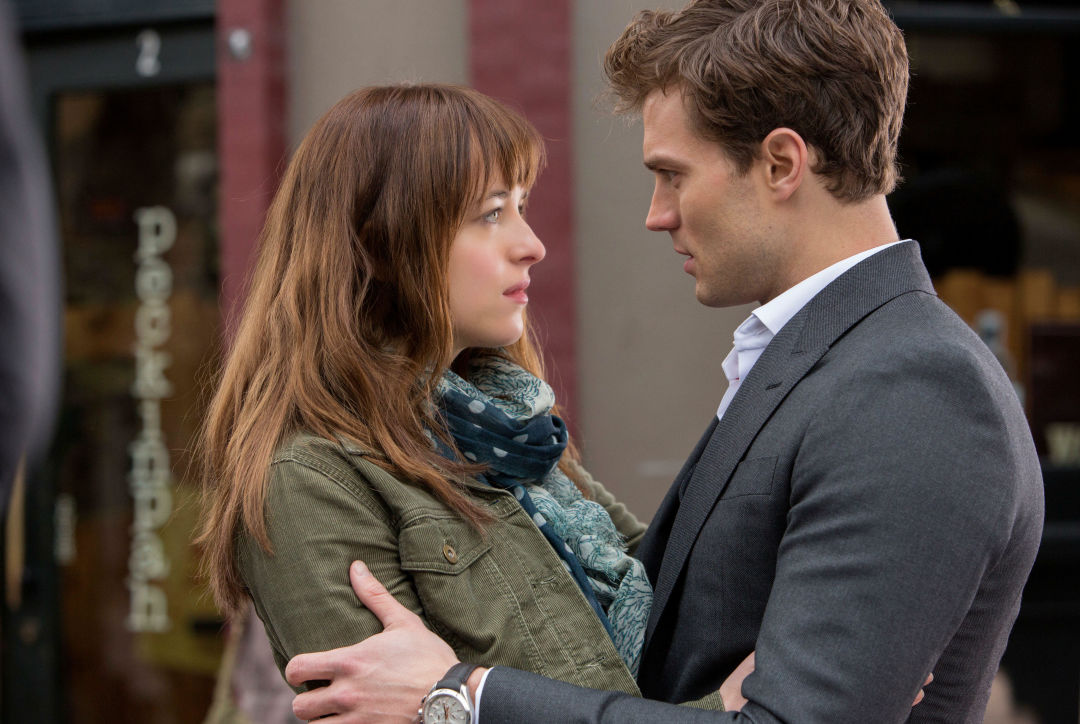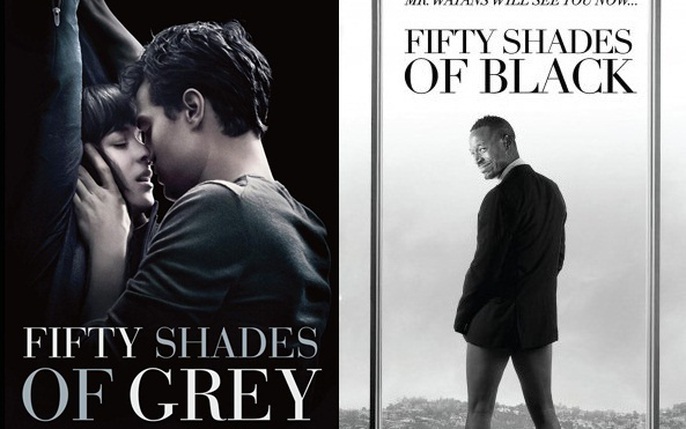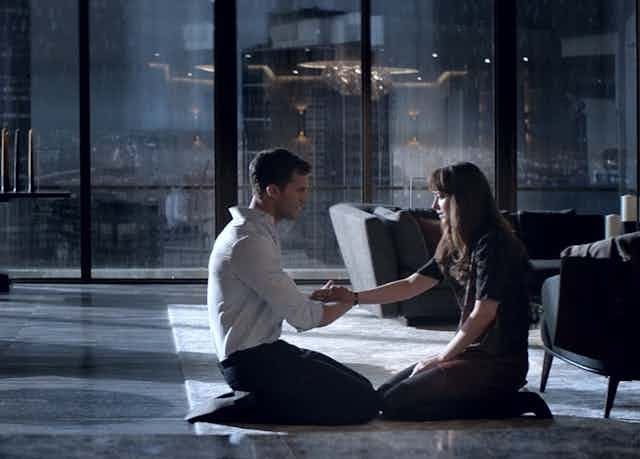
Another sequel so awful that it needs to be described in detail to be believed
For reasons that are now obscure to me—and were by definition ill-conceived—I read Fifty Shades of Grey at that terrible moment in American history when it seemed that everyone else was reading it too. I don’t believe that I read either of the book’s sequels, though I can’t attest to that with much confidence. Suffice to say that I made either the wise decision to skip them or the only marginally less-wise decision to repress all memory of them.

But writing about movies is something I’m paid to do, and occasionally that entails a degree of professional self-sacrifice. This week, the name of that sacrifice is Fifty Shades Freed.
The third and final—let’s pause and savor that word for a moment—adaptation of the “erotic romance” novel series by Erika Mitchell (pen name: E. L. James), Fifty Shades Freed is precisely as atrocious as one might imagine. Which is to say, it is far worse than the first movie—which, though awful, in hindsight looks like Citizen Kane, only with more discussion of dildos. I’d place the new film more or less on a par with the second one, Fifty Shades Darker, which makes sense given that both were filmed concurrently, were directed by James Foley (whose principal recommendation is that he directed Glengarry Glen Ross many, many years ago), and were adapted by Niall Leonard (whose principal recommendation is that he is married to Erika Mitchell).

The good news—and, yes, we are grading on a curve so steep that it’s essentially a vertical drop—is that Fifty Shades Freed is marginally less retrograde and offensive than Fifty Shades Darker. The bad news is that it is even more idiotic, which is in its way a remarkable achievementIn any case, like its predecessor, it is eminently deserving of one in my occasional series of spoilereviews: a linear enunciation of all the stupid elements of the film that I managed to scribble into my notebook during the screening. (Other examples of the microgenre have included Lucy, Fantastic Four, The Happening, and The Gunman.) To be clear: What follows will give away as many plot developments as possible, as it is intended to serve as an alternative to actually seeing the movie. But I feel confident that the universe of people who would like to laugh at this film is considerably larger than the universe of those who are actually willing to sit through it. So here goes.
1. To catch up anyone who is either unfamiliar with the series or as adept as I may be in the art of repression: In the first film, Anastasia Steele (Dakota Johnson), a virginal college student, was persuaded by the billionaire entrepreneur Christian Grey (Jamie Dornan) to become his S&M sexual “submissive.” She rebelled vaguely at the end of the film, only to be successfully wooed again in the second, which largely set aside the naughty S&M theme that had been the entire rationale for the enterprise in the first place. (Its “climax” was that Christian took Ana to his Red Room of Pain and … applied massage oil.) The only other bits that I think were of any importance are that 1) Ana’s boss at the Seattle publishing house where she worked sexually assaulted her, so Christian pulled strings to have him fired; and 2) Christian proposed marriage, offering a ring large enough to double as a bocce ball, and Ana accepted.

2. So Fifty Shades Freed opens with a wedding. We watch the gorgeous lace of Ana’s wedding dress being buttoned; we marvel at the hefty, masculine majesty of Christian’s cuff links. Alas, their vows are heartbreakingly conventional: “I promise to love, trust, and protect you”; “I give you my hand and my heart, for as long as we both shall live.” Boo! Where are the references to domination and submission, to flogging and spanking, to the Red Room? What movie is this
3. After some dancing, Christian tells Ana, “Let’s get out of here. I’m sick of sharing you with all the riff-raff.” Not to get all class warrior here, but that may not be the best phrase for a billionaire to throw around with his now billionaire-by-marriage wife. It sounds a tad, let us say, Steve Mnuchin-y.
4. Christian whisks Ana to the airport, where a private jet is waiting. “You own this?” she asks, incredulous. Hello? He’s spent two movies taking her up in gliders and helicopters and out on million-dollar sailboats. She’s surprised he has a private jet? Ana actually seems to remember what happened in those films even less than I do.
5. Paris! If the Eiffel Tower didn’t give it away, the movie adds the Arc de Triomphe as a secondary clue. They go to the opera. They hold hands. They have tasteful, from-a-distance, no-nudity sex. This may be the worst advertisement for marriage of all time. Your most conservative grandparent is probably getting bored about now.
6. They continue on to the Côte d’Azur. At a topless beach, Ana wants to take off her bikini top, but lifelong-pervert-turned-sudden-prude Christian forbids it. When he goes for a swim, she takes her top off anyway, which may be the most self-actualized thing she’s done in all the movies combined. Progress, I guess.
7. They go back to the luxury yacht they’re staying on. Christian, still peeved that Ana disobeyed him re: toplessness, pulls out handcuffs. She seems aghast. Once again, it appears that she has no recollection of the previous two movies. Is there a roofie subtext to the whole trilogy that is never made explicit?
8. Alas, the honeymoon is cut short. A female subordinate of Christian’s calls to tell him that someone broke into his company’s “server room” and detonated an “explosive device.” Watching the security footage, Ana recognizes the intruder as Jack Hyde (Eric Johnson), the former boss who attacked her and was essentially fired by Christian. “Why would he do that?” Ana asks. Really? Crazy or not, his motive seems pretty self-evident. Or is it?:max_bytes(150000):strip_icc()/051922-fifty-shades-grey-outfits-lead-2000-8678bebe15cf48edb372e739384a0c9f.jpg)
8a. Yes, Jack “Hyde” easily wins the otherwise-close competition for most ridiculously metaphorical surname.
8b. As I noted in the spoilereview for the previous movie, with the exception of security guards, virtually all subordinates in the Fifty Shades universe are female. I may be missing some small exception somewhere, but perhaps the most consistently clear message of the whole series is that women always work for men and not the reverse.
9. Back at Christian’s penthouse apartment in Seattle, Ana meets the staff and is flabbergasted at the question of how she wishes to “run the household.” I swear she was unconscious throughout the first two movies. How I envy her.
10. Ana dismisses the cook for the night because she wants to make dinner. Christian: “I could get used to you in the kitchen.” Ana: “Barefoot and pregnant?” Christian is obviously nonplussed by this response, and it doesn’t appear that it’s over Ana’s possible neglect of footwear. This is what in introductory screenwriting classes is called foreshadowing.
